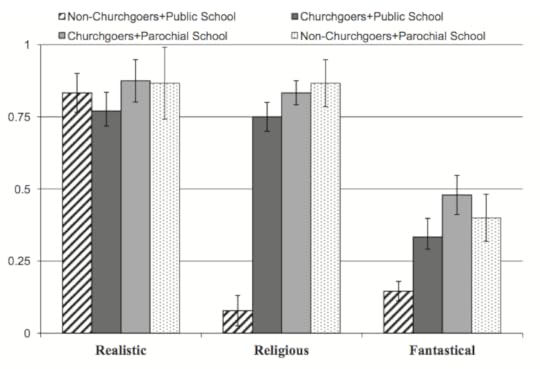Hemant Mehta's Blog, page 1973
July 19, 2014
An Exclusive First Look Inside the Bible Museum’s Gift Shop
The owners of Hobby Lobby have announced they’ll be opening a Bible Museum in Washington, D.C. in 2017.
We here at Friendly Atheist were able to get a special sneak preview of what they’ll be selling in the gift shop! Have a look:
Unfortunately, it doesn’t look like you can order any of these items in advance.
I Can’t Take This Movie About Two Christian Virgins Seriously
I don’t know if I’m in a bad mood. Maybe I’m just in a bad mood. But I got angry watching this trailer for a new Christian movie about two virgins who wait until marriage to get it on. It turns out the guy’s getting deployed the day after the wedding, so they only have one night to make sweet, sweet, Jesus-y love… but they keep hitting obstacles every time they try:
Why can’t they just do it right there?
I know I’ve only seen the trailer, and I know I’m not really the target audience, but I’ll go ahead and tell you why the movie doesn’t work for me.
The premise is dumb.
I don’t feel bad for these characters at all. They chose to wait, and now they’re upset because everything’s not completely perfect on Night One? Too. Damn. Bad.
Maybe they shouldn’t have waited if they knew the guy was being deployed.
Maybe they shouldn’t have treated sex like it was the reward for marriage.
Maybe they should stop trying to make everything perfect and just jump each other on the porch of that locked house.
I don’t know how this movie ends. Maybe they do end up having sex. Or maybe they realize being with each other emotionally is more important that what they do with their bodies. Or maybe they decide to wait a little longer until the guy comes back home. Or maybe the guy dies in the war and they regret their stupid decision and everyone in the audience demands their money back.
Or maybe I’m just in a bad mood.
(via Christian Nightmares)
Pro-Life Nurse Sues Family Planning Clinic for Not Hiring Her to Do the Job She Refused to Do
We have a new frontrunner in the race for dumbest Christian Right lawsuit.
Sara Hellwege, a pro-life nurse, applied for a job at Tampa Family Health Centers (in Florida) this past April. TFHC is a Title X clinic, meaning they’re all about things like family planning, contraception, and birth control.
So when Hellwege mentioned her affiliation with the “American Association of Pro-Life Obstetricians and Gynecologists” in her resume, the interviewer (Chad Lindsey) asked her if that would be a problem since, you know, conservative Christians + birth control = crazytown.
Hellwege said she couldn’t prescribe birth control since, in her unscientific mind, it caused abortions. Lindsey, knowing that all of the job openings involved prescribing birth control, told her there were no other positions available and that there was no reason to proceed with the interview process.
So she’s suing him.
I repeat: She’s suing him because he’s not hiring her for a job she refuses to do.
It makes as much sense as a vegetarian suing Taco Bell for not hiring him even though he told the manager he couldn’t be near meat.
The misnamed Alliance Defending Freedom reiterated the whole misunderstanding about how birth control works while completely ignoring the job description:
“Willingness to commit an abortion cannot be a litmus test for employment,” added ADF Senior Counsel Steven H. Aden. “All we are asking is for the health center to obey the law and not make a nurse’s employment contingent upon giving up her respect for life.”
I know we’re talking about birth control, and most forms of birth control are not abortifacients, but let’s roll with it for a second. If the job involves helping women obtain abortions, and you don’t want to help women obtain abortions for whatever reason, go find another job. Hellwege can’t do the very thing they need her to do.
No one owes her a job when she refuses to do it.
Maybe I should apply for an attorney position at ADF. My own sincere beliefs prevent me from defending Christians who have martyr complexes, but screw it. ADF owes me a paycheck.
Gregory M. Lipper of Americans United for Separation of Church and State put it simply: “Even after Hobby Lobby, this lawsuit retires the trophy for chutzpah.”
(Thanks to Brian for the link)
Obama’s Executive Order Barring Federal Contractors from LGBT Discrimination Will Not Include Religious Exemption
Despite calls from people like Pastor Rick Warren (below) to allow religious groups receiving federal contracts to discriminate against LGBT Americans, President Obama announced last night that his forthcoming executive order would not include any religious exemptions.
Religious groups had sought the exemption to ensure that they would not lose federal money or contracts if they could not meet the new guidelines because of their beliefs.
Galen Carey, the vice president of government relations for the National Association of Evangelicals, said he expected the president’s executive order would lead to a lengthy and expensive legal fight.
“It would be better if the president could provide leadership that promotes tolerance all the way around,” Mr. Carey said, “rather than use the force of the state.”
There’s some evangelical logic for you: Why can’t the President tolerate our intolerance?
Obama absolutely did the right thing. Church groups are free to discriminate however they’d like, but they shouldn’t be allowed to do it using taxpayer money. In fact, more than 100 religious and secular groups agreed, urging Obama in a letter not to include the exemption.
Beyond the moral issue here, what he did was also politically savvy, giving his progressive base some news to get excited about.
It wasn’t completely ideal: An existing executive order made by President George W. Bush says that religious groups receiving federal contracts can still favor people of their own faith when hiring. That order is still in effect now, possibly providing employers with a loophole that could let them get away with not hiring LGBT people. (It’s not like a lot of gays and lesbians are out and proud evangelicals, after all.) But you have to figure any employers would be more likely to hire people they already share a bond with.
Conservative leaders will inevitably cry “religious discrimination,” but this is precisely the opposite. Religious groups will continue to get federal contracts. They just have to figure out what’s more important to them: Government funding… or their irrational focus on homosexuality over every other sin. (It’s not like they were fighting to discriminate against adulterers or divorced people.)
If they really care most about helping those who are less fortunate, working alongside a gay person shouldn’t affect what they do. But if Rick Warren wants to make that argument, he can go right ahead. I’m sure young Christians can’t wait to hear another reason to walk away from the church for good.
July 18, 2014
Foundation Beyond Belief Members Raised $62,105 for Charity Over the Past Three Months
Foundation Beyond Belief just released the results from the Second Quarter of 2014. Check out the donations — $62,105 in total given by atheists — to the following organizations:
Once again, three organizations received more than $10,000 (and two were extremely close!). What an absolutely incredible response!
If you’d like to see these numbers go up even higher, please join us! You can see a list of our current charities here.
WGN News Shines a Spotlight on Humanist Activist Leo Igwe
In anticipation for this weekend’s Humanism At Work conference in Chicago, WGN’s Larry Potash (Really? Twice today?!) ran a great segment on Humanist activist Leo Igwe and his work ending the horrific practice of witch-hunting in Africa:
If you’re unfamiliar with Igwe, you can read a lot of his articles here.
Secular Student Alliance Announces Free Membership for All Students
Whoa. The Secular Student Alliance just announced that membership to all students (of any age group) is now free:
Many organizations offer “student” memberships: reduced-rate and reduced-benefit versions of the full memberships reserved for people with full pockets. Not here! Students are the core of the Secular Student Alliance, and so our student members not only get every single benefit that non-student members get — you get extra benefits not available to non-students!
If you’re not already a member, go sign up now. The opportunities you have as a member are just boundless and you’d be helping a great cause.
For the Colorado State House Candidate Who Thinks the Penalty for Homosexuality Is “Spiritual Death”…
Gordon Klingenschmitt, a Republican nominee for the Colorado State House, made some awful comments on his show this week — you can see them for yourself here — so I made this just for him:
Has This Happened To You? A Friend Paid Me a Backhanded Compliment: “You’re One of the Good Atheists.”
I consider Craig a friend of the family, mostly because “acquaintance of the family” is a weird term. We’re not close, but I’ve known Craig for six or seven years. He’s intelligent and affectionate and entrepreneurial and geeky and a little high-strung, a fast-talking man of ideas who is designing and building his own quadcopter — one that, he says, is big enough to take his 175-pound frame into the skies. Every summer, Craig vacations on the East Coast island where I live. Then he disappears back home to California, and I don’t see him for 10 or 11 months.
He dropped by unannounced the other day, as he sometimes does. I don’t think we’d ever discussed religion or atheism, though I must have mentioned at some point that I’m not a believer. Apparently, that made an impression on Craig.
He sums up his genuinely warm feelings with a “Good to see you buddy” as we stand talking in my kitchen. And then, out of the clear blue sky, he adds: “You’re my favorite atheist.”
I think I arched an eyebrow. Maybe two.
“I am?”
“Yeah man. You know how I figured out that you’re one of the good ones?”
He means it in the best possible way. I can tell. But we’re on thin ice, because the subtext is clear — I am one of the few good atheists. An exception.
He reminds me of the jovial Mississippi father of the bride who told me he was friends with the two African-American musicians he’d flown in to entertain the wedding guests: “I don’t like to associate with black folks much, but John and Miriam are good, hardworking people.”
Smiling, I tell Craig that no, I don’t know how he came to his conclusion.
“Because a few years ago, you told me about a dog — it wasn’t even your dog — who was put to death at the shelter, and you began tearing up.”
I remember that. My family had offered to give a friendly, lumbering Saint Bernard named Baxter a good home. The SPCA turned us down. We weren’t deemed suitable because we had children under 12. Unbelievably, none of the SPCA shelter dogs we looked at were cleared to be adopted by families with preteens. It didn’t matter that our kids grew up around dogs, including our two German shepherds.
A few months months later, I heard from a volunteer at the supposedly no-kill shelter that Baxter had been euthanized because “no one wanted him.”
I’d told some people how upset I was, Craig among them. He remembers that my voice cracked when I spoke of Baxter. And that’s how he knew I am not a terrible human being.
I have no idea what Craig’s metaphysical view of the world is, and how religion fits into that. I do know that I would be selling him short if I attributed a lack of empathy to him based on whatever that belief is. If someone exhibits a common emotion, it would be prejudicial to say to yourself, “I wasn’t expecting that from a Christian,” or “That’s surprising for a Jew.”
Craig wasn’t even muttering that sentiment to himself. He felt free to say it to me, to my face – that I’m a good atheist because I showed a flash of sorrow about the death of a sentient fellow being.
I don’t live my life looking for things to take umbrage at, and I won’t now. Craig’s sincere if accidentally backhanded compliment won’t keep me up at night. But as soft anti-atheist bigotry goes, it sure was a memorable moment.
=-=-=-=-=-=-=-=-=-=-=-=-=-=-=
Have you experienced anything similar? How did you respond? Let us know in the comments.
(Image via Shutterstock)
New Study Shows That Children Exposed to Religion Have a Hard Time Distinguishing Fact from Fiction
Five- and six-year-old children know that George Washington was a real person and Snow White is fictional.
But what if you told them this story?
God warned Noah about a flood that was going to cover the Earth. Noah and his wife built a giant boat and gathered two of every kind of animal before the flood came. They were very worried but Noah, his family, and all the animals drifted for days until they reached new land.
Real or pretend?
A new study published in the journal Cognitive Science explored that very question. Without going into too much detail, researchers gathered 5- and 6-year-olds and divided them up into four groups:
Kids who attend public school and go to church
Kids who attend public school and don’t go to church
Kids who attend parochial school and go to church
Kids who attend parochial school and don’t go to church
Then they read them a series of biblical stories that are familiar to all of us (like the stories of Noah or Moses or Joseph)… but they modified them. In some cases, they just read the religious stories straight up (“Religious”). In some cases, they removed the God element and replaced it with Magic (“Fantastical”). In some cases, they removed the supernatural elements altogether (“Realistic”). Different stories were read to different kids.
Now, here’s what *should* have happened:
When the kids heard the realistic stories, they should have said the character seemed real. Turns out they all did that!
When the kids heard the fantastical stories, they should have said the character seemed pretend. The kids were all over the place here… but they generally did that.
When the kids heard the religious stories, they should have said the character was pretend. Let’s see how that went:
In that picture, on the vertical axis, 0 means pretend and 1 means real. So, when it comes to the realistic stories, all the bars are pretty close to 1.
But look at that middle chunk representing the religious stories. Only one group, the bar on the left, correctly said those stories were pretend: The non-church-going kids who attended public school.
Even with the fantastical stories, that same group was most likely to say they were pretend.
The researchers say these results throw that whole theory that children are “born believers” right out the window:
Our central question concerned children’s judgments about the status of story characters in religious stories. Children with exposure to religion — via church attendance, parochial schooling, or both — judged such characters to be real. By contrast, children with no such exposure judged them to be pretend. This sharp discrepancy between children with and without exposure to religion lends no support to the hypothesis that children are “born believers”… with a natural credulity toward extraordinary beings with superhuman powers. Indeed, secular children responded to religious stories in much the same way as they responded to fantastical stories — they judged the protagonist to be pretend.
…
The same researchers also did another experiment. This time, they went to the extremes. They took public school kids who didn’t go to church and parochial school kids who did go to church.
They read the kids different kinds of stories, all based on a classic Bible tale. For example, here’s a simplified version of how they used the Moses story:
Familiar/Magical: John waved his magic stick and parted the red sea.
Familiar/non-Magical: John waved his stick and parted the red sea.
Unfamiliar/Magical: John waved his magic stick and parted the mountain.
Unfamiliar/non-Magical: John waved his stick and parted the mountain.
Once again, the kids were supposed to separate whichever story they heard into “real” or “pretend.” (In this case, all of the stories were “pretend” because you can’t part a sea or mountain.)
How did they do? Keep in mind that 0 means pretend and 1 means real, so they should have had lower numbers down the line…
Whoa. In every single instance, the secular group had lower scores than the religious group (meaning they were more correct).
What’s up with these results, researchers?
… in both studies, secular children systematically categorized the characters embedded in fantastical stories as pretend, and most of their justifications referred to the impossibility of a central event in the story. Effectively, secular children responded to these stories just as they might respond to a fairy story — they inferred that the central characters were fictional because they were involved in an event that is ordinarily impossible in reality. The pattern of responding for children exposed to religion was different. In both studies, they [children exposed to religion] were less likely to judge the characters in the fantastical stories as pretend, and in line with this equivocation, they made more appeals to reality and fewer appeals to impossibility than did secular children.
In short, kids exposed to religion believed the stories with magical/supernatural aspects to it because they didn’t think those things were impossible.
Religion blurs the lines between fact and fiction. You only hope kids exposed to it figure it out soon enough.
Unfortunately, not all of them do. We know there are adults who never learn the difference between fact and fiction. We call them Creationists. (And some of them even get elected to public office!)
It’s just more evidence for those who believe religious indoctrination is a form of mental child abuse.
By the way, there are a couple methodological concerns with the study (freely admitted by the researchers). First, they took the kids at their word about whether or not they attended church. Second, it’s possible that other factors — not simply exposure to religion — caused the difference in perception between fact and fiction. The researchers believe, however, that neither of those concerns played a significant role in their study.
(Image via Shutterstock. Thanks to Brian for the link)
Hemant Mehta's Blog
- Hemant Mehta's profile
- 39 followers





















